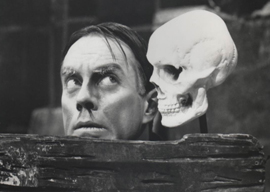
November 05, 2016

There would be many other wacky television hosts in the next decade, many of them copying the Zacherle formula, so RKO was able to package Shock Theater as a franchise. Ernie Anderson, a sketch comedian and the voice-over announcer for KYW-TV Channel 3 in Cleveland, created a subversive beatnik character called “Ghoulardi,” using identical films for a show called Shock Theater between 1963 and 1966. Anderson was eventually fired for telling children to “blow stuff up,” moving to Los Angeles where he become the voice of the ABC Network (“The Loooooove Boat”). When I asked him to don the Ghoulardi makeup and do the bit one last time, 30 years after his firing, he still had backstage jitters, the sign of a true perfectionist. Similarly, Bill Camfield was an ad salesman at KFJZ Channel 11 in Fort Worth, Tex., when he first assumed the übernerd character of “Icky Twerp” for a show called Slambang Theater that was fondly remembered five decades later. The formula was repeated across the country, market by market, as station managers asked the sales guy, or the production guy, or the CPA, to suit up and “do one of those Zacherle shows””but very few of them could.
That’s why John Zacherle is the D.W. Griffith of all the movie hosts, whether late-night, Saturday-morning, or Thursday-afternoon”because he invented and perfected all the formats. (He was ripped off by everyone but was never bothered by it, thinking of his template as shareware. Vampira was not so generous. She sued a producer, a television station, and Cassandra Peterson in a nasty bit of litigation that Cassandra, taking the high road, has never talked about.)
Most people on the East Coast remember Zacherle for his 1960s show on WOR-TV Channel 9, the independent station in Secaucus, N.J., famous for showing King Kong and Godzilla every Thanksgiving, but he also had stints on New York’s WABC Channel 7 and WPIX Channel 11, the indie station owned by the New York Daily News that had a whole stable of movie hosts (“Officer Joe” hosting The Three Stooges and The Little Rascals, “Captain Jack” hosting Popeye). Oddly enough, his longest-running gig was Disc-O-Teen, an after-school dance party aired live by WNJU Channel 47 from the Mosque Theater in downtown Newark. Zacherle always had an affinity for music”his novelty song “Dinner With Drac” hit the top 10 list”and it was his old friend and fellow Philadelphian Dick Clark who named him “the Cool Ghoul” in the first place. In later years he worked as a radio disc jockey and was the king of the walk-on guest shot, capped by his appearance as the Wizard on Captain Kangaroo, keeping his fees low enough to make sure he could always take the gig. I never knew him to upstage anyone or steal a line”he was happy to be an ensemble player when needed and the star when called for.
I honestly don”t think John knew how beloved he was. The first time I met him, we were taping on a crappy insert stage overlooking the Penn Station railroad yards on 35th Street, and I was working with a New Jersey crew that had been through the wars. None of them liked working with celebrities. Celebrities wasted time and demanded script changes and were rude to the makeup girl. Celebrities wanted to know why we were shooting on a crappy insert stage on 35th Street. Even the nice celebrities never seemed to realize that the sound guy was there for a reason and the lighting tweaks that annoyed them so much were what made them look beautiful later. Anytime the schedule involved celebrity guests, the blue-collar crew steeled themselves for trouble, bit their collective tongues, and bunkered in for the duration.
On the day Zacherle was scheduled, an ex-Marine working as best boy came up to me at eight in the morning to find out when John would be there. When Zacherle arrived, about six of the toughest hombres I”ve ever worked with lined up to get his autograph. Zacherle cheerfully amused them with puns and old bits that he”d been doing for 30 years, then told me he was at my service.
And he was. He was a soldier. He was there to work and amuse. He didn”t care that we were working on a crappy insert stage because his whole life had been on a crappy insert stage, and he knew the journey was not about the stage, it was about the life and joy you created while you were standing on it.